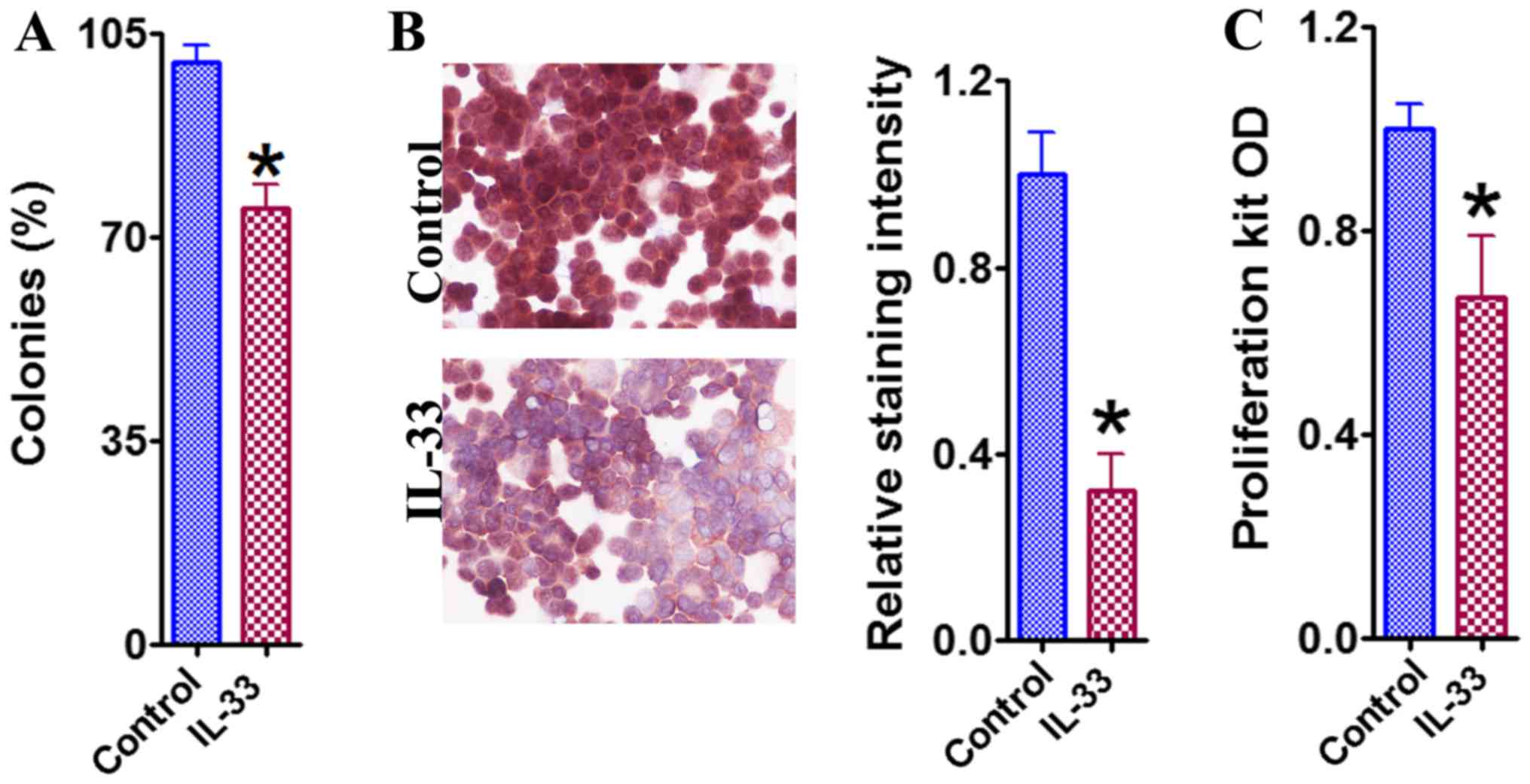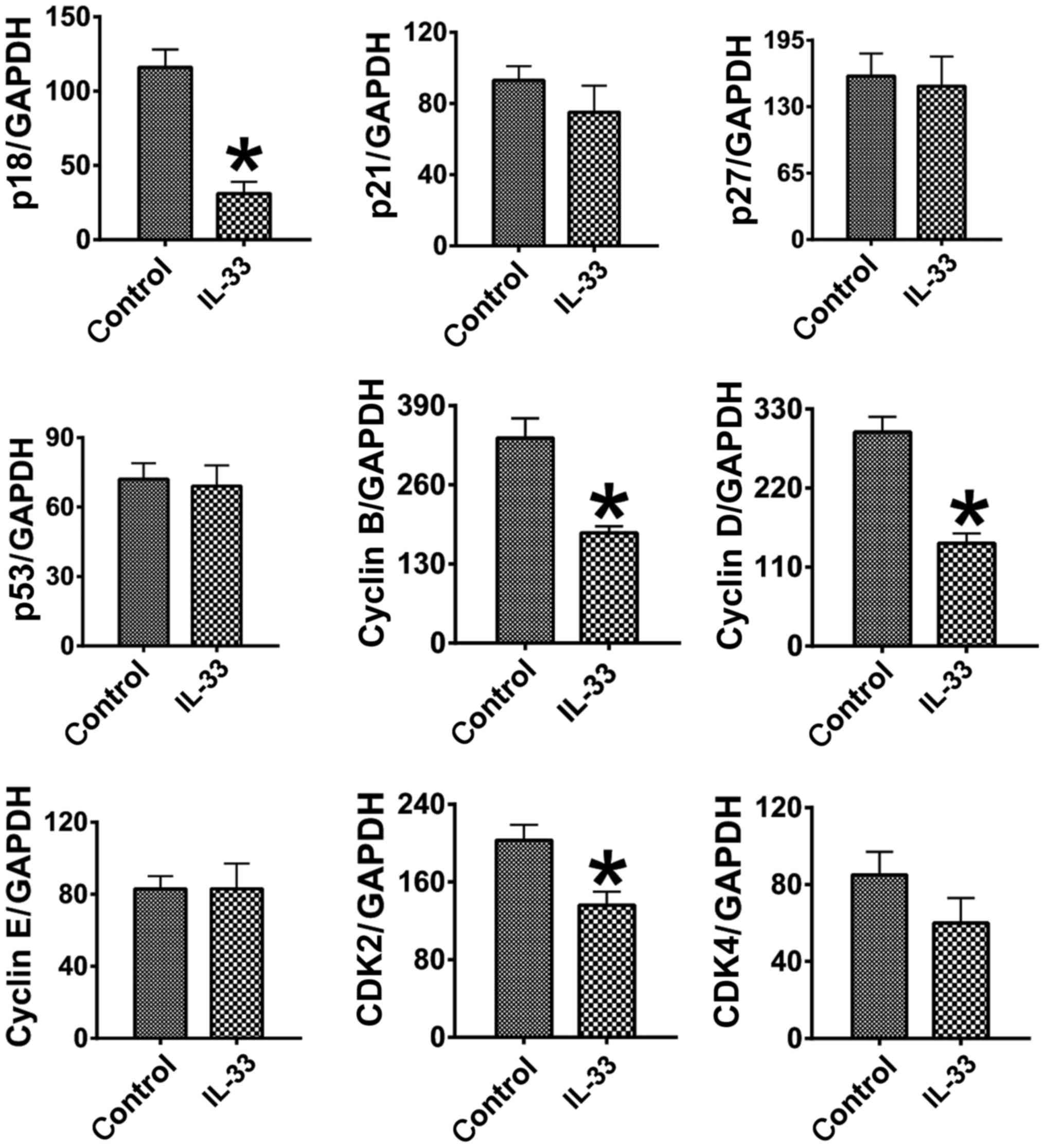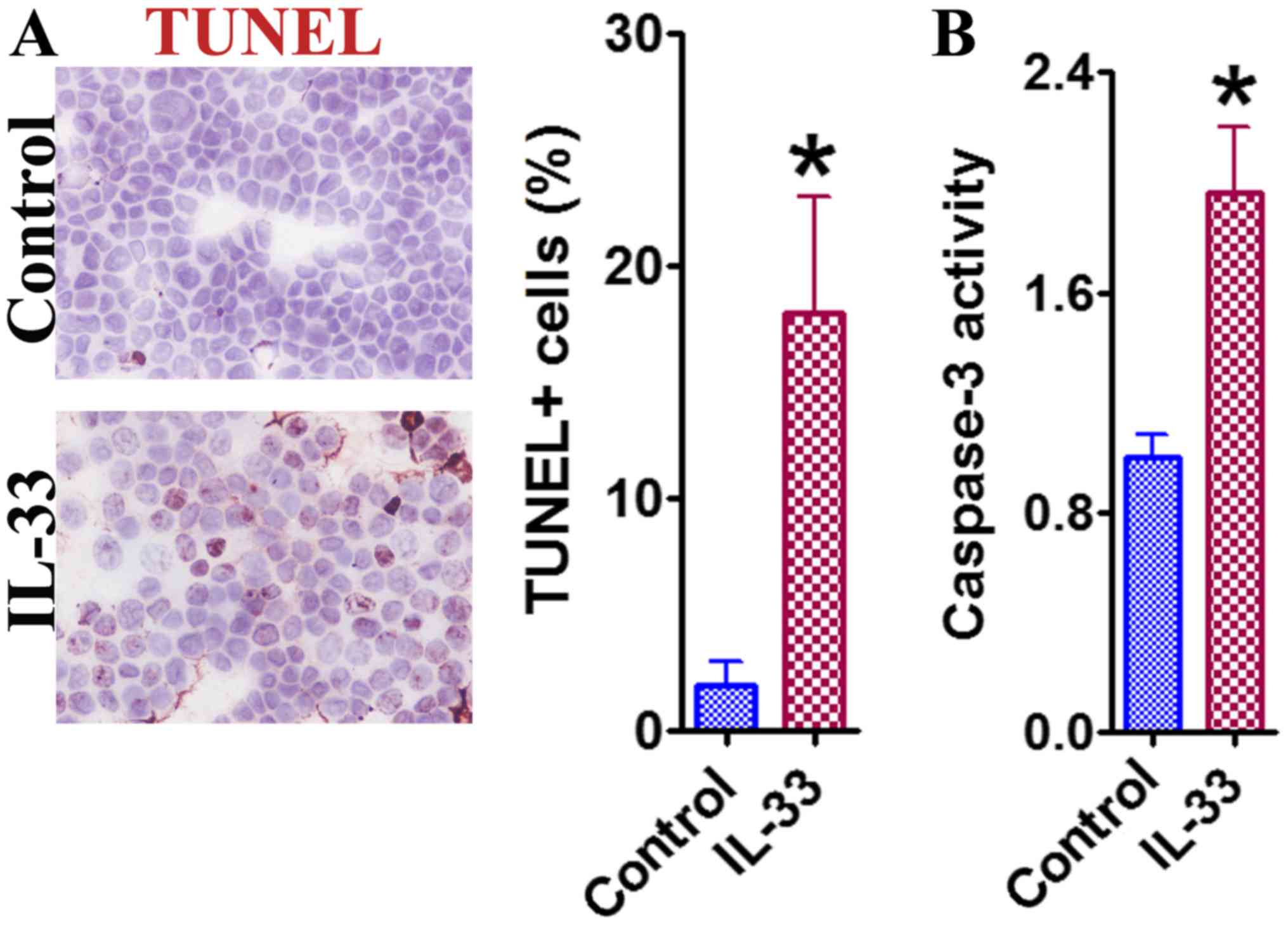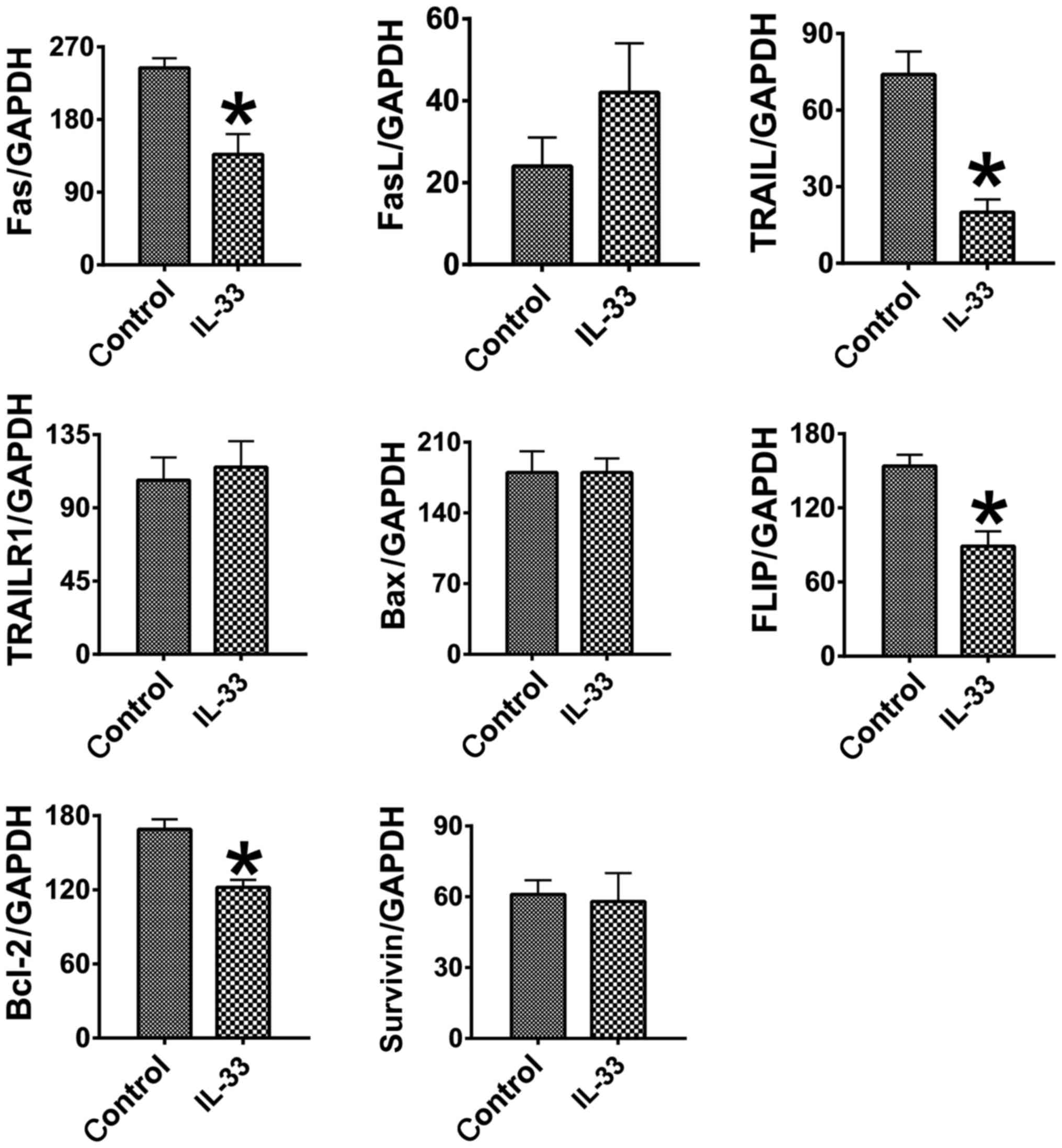|
1
|
Siegel RL, Miller KD and Jemal A: Cancer
statistics, 2016. CA Cancer J Clin. 66:7–30. 2016. View Article : Google Scholar : PubMed/NCBI
|
|
2
|
Brenner H, Kloor M and Pox CP: Colorectal
cancer. Lancet. 383:1490–1502. 2014. View Article : Google Scholar : PubMed/NCBI
|
|
3
|
Porta C, Paglino C, Imarisio I and Bonomi
L: Cytokine-based immunotherapy for advanced kidney cancer: Past
results and future perspectives in the era of molecularly targeted
agents. ScientificWorldJournal. 7:837–849. 2007. View Article : Google Scholar : PubMed/NCBI
|
|
4
|
Schmitz J, Owyang A, Oldham E, Song Y,
Murphy E, McClanahan TK, Zurawski G, Moshrefi M, Qin J, Li X, et
al: IL-33, an interleukin-1-like cytokine that signals via the IL-1
receptor-related protein ST2 and induces T helper type 2-associated
cytokines. Immunity. 23:479–490. 2005. View Article : Google Scholar : PubMed/NCBI
|
|
5
|
Moussion C, Ortega N and Girard JP: The
IL-1-like cytokine IL-33 is constitutively expressed in the nucleus
of endothelial cells and epithelial cells in vivo: A novel
‘alarmin’? PLoS One. 3:e33312008. View Article : Google Scholar : PubMed/NCBI
|
|
6
|
Jovanovic I, Radosavljevic G, Mitrovic M,
Juranic VL, McKenzie AN, Arsenijevic N, Jonjic S and Lukic ML: ST2
deletion enhances innate and acquired immunity to murine mammary
carcinoma. Eur J Immunol. 41:1902–1912. 2011. View Article : Google Scholar : PubMed/NCBI
|
|
7
|
Kim W, Kim J, Kim H, Cho H and Kwon B:
Association of inhibition of tumor growth with intratumoral
hematopoiesis induced by IL-33. J Immunol. 186 Suppl 1:(48):
402011.
|
|
8
|
Duault C, Betous D, Bezombes C, Roga S,
Cayrol C, Girard JP, Fournié JJ and Poupot M: IL-33-expanded human
Vγ9Vδ2 T cells have anti-lymphoma effect in a mouse tumor model.
Eur J Immunol. 47:2137–2141. 2017. View Article : Google Scholar : PubMed/NCBI
|
|
9
|
He Z, Chen L, Souto FO, Canasto-Chibuque
C, Bongers G, Deshpande M, Harpaz N, Ko HM, Kelley K, Furtado GC
and Lira SA: Epithelial-derived IL-33 promotes intestinal
tumorigenesis in Apc Min/+ mice. Sci Rep. 7:55202017. View Article : Google Scholar : PubMed/NCBI
|
|
10
|
Kim JY, Lim SC, Kim G, Yun HJ, Ahn SG and
Choi HS: Interleukin-33/ST2 axis promotes epithelial cell
transformation and breast tumorigenesis via upregulation of COT
activity. Oncogene. 34:4928–4938. 2015. View Article : Google Scholar : PubMed/NCBI
|
|
11
|
Fang M, Li Y, Huang K, Qi S, Zhang J,
Zgodzinski W, Majewski M, Wallner G, Gozdz S, Macek P, et al: IL33
promotes colon cancer cell stemness via JNK activation and
macrophage recruitment. Cancer Res. 77:2735–2745. 2017. View Article : Google Scholar : PubMed/NCBI
|
|
12
|
Fang Y, Zhao L, Xiao H, Cook KM, Bai Q,
Herrick EJ, Chen X, Qin C, Zhu Z, Wakefield MR and Nicholl MB:
IL-33 acts as a foe to MIA PaCa-2 pancreatic cancer. Med Oncol.
34:232017. View Article : Google Scholar : PubMed/NCBI
|
|
13
|
Fang Y, DeMarco VG and Nicholl MB:
Resveratrol enhances radiation sensitivity in prostate cancer by
inhibiting cell proliferation and promoting cell senescence and
apoptosis. Cancer Sci. 103:1090–1098. 2012. View Article : Google Scholar : PubMed/NCBI
|
|
14
|
Fang Y, Yu S and Braley-Mullen H: TGF-β
promotes proliferation of thyroid epithelial cells in IFN-γ−/− mice
by down-regulation of p21 and p27 via AKT pathway. Am J Pathol.
180:650–660. 2012. View Article : Google Scholar : PubMed/NCBI
|
|
15
|
Fang Y and Braley-Mullen H: Cultured
murine thyroid epithelial cells expressing transgenic
Fas-associated death domain-like interleukin-1beta converting
enzyme inhibitory protein are protected from Fas-mediated
apoptosis. Endocrinology. 149:3321–3329. 2008. View Article : Google Scholar : PubMed/NCBI
|
|
16
|
Fang Y, Sharp GC, Yagita H and
Braley-Mullen H: A critical role for TRAIL in resolution of
granulomatous experimental autoimmune thyroiditis. J Pathol.
216:505–513. 2008. View Article : Google Scholar : PubMed/NCBI
|
|
17
|
Fang Y, Wei Y, DeMarco V, Chen K, Sharp GC
and Braley-Mullen H: Murine FLIP transgene expressed on thyroid
epithelial cells promotes resolution of granulomatous experimental
autoimmune thyroiditis in DBA/1 mice. Am J Pathol. 170:875–887.
2007. View Article : Google Scholar : PubMed/NCBI
|
|
18
|
Fang Y, Chen X, Bai Q, Qin C, Mohamud AO,
Zhu Z, Ball TW, Ruth CM, Newcomer DR, Herrick EJ and Nicholl MB:
IL-9 inhibits HTB-72 melanoma cell growth through upregulation of
p21 and TRAIL. J Surg Oncol. 111:969–974. 2015. View Article : Google Scholar : PubMed/NCBI
|
|
19
|
Nicholl MB, Chen X, Qin C, Bai Q, Zhu Z,
Davis MR and Fang Y: IL-32α has differential effects on
proliferation and apoptosis of human melanoma cell lines. J Surg
Oncol. 113:364–369. 2016. View Article : Google Scholar : PubMed/NCBI
|
|
20
|
Zhu Z, Davidson KT, Brittingham A,
Wakefield MR, Bai Q, Xiao H and Fang Y: Trichomonas vaginalis: A
possible foe to prostate cancer. Med Oncol. 33:1152016. View Article : Google Scholar : PubMed/NCBI
|
|
21
|
Zhang Y, Davis C, Shah S, Hughes D, Ryan
JC, Altomare D and Peña MM: IL-33 promotes growth and liver
metastasis of colorectal cancer in mice by remodeling the tumor
microenvironment and inducing angiogenesis. Mol Carcinog.
56:272–287. 2017. View
Article : Google Scholar : PubMed/NCBI
|
|
22
|
Griesenauer B and Paczesny S: The
ST2/iL-33 Axis in immune cells during inflammatory diseases. Front
Immunol. 8:752017. View Article : Google Scholar : PubMed/NCBI
|
|
23
|
Lock FE, Babaian A, Zhang Y, Gagnier L,
Kuah S, Weberling A, Karimi MM and Mager DL: A novel isoform of
IL-33 revealed by screening for transposable element promoted genes
in human colorectal cancer. PLoS One. 12:e01806592017. View Article : Google Scholar : PubMed/NCBI
|
|
24
|
Liew FY, Pitman NI and McInnes IB:
Disease-associated functions of IL-33: The new kid in the IL-1
family. Nat Rev Immunol. 10:103–110. 2010. View Article : Google Scholar : PubMed/NCBI
|
|
25
|
Nicholl MB, Ledgewood CL, Chen X, Bai Q,
Qin C, Cook KM, Herrick EJ, Diaz-Arias A, Moore BJ and Fang Y:
Il-35 promotes pancreas cancer growth through enhancement of
proliferation and inhibition of apoptosis: Evidence for a role as
an autocrine growth factor. Cytokine. 70:126–133. 2014. View Article : Google Scholar : PubMed/NCBI
|
|
26
|
Zhang D, Li X, Chen C, Li Y, Zhao L, Jing
Y, Liu W, Wang X, Zhang Y, Xia H, et al: Attenuation of
p38-mediated miR-1/133 expression facilitates myoblast
proliferation during the early stage of muscle regeneration. PLoS
One. 7:e414782012. View Article : Google Scholar : PubMed/NCBI
|
|
27
|
Zhu Z, Zhang D, Lee H, Menon AA, Wu J, Hu
K and Jin Y: Macrophage-derived apoptotic bodies promote the
proliferation of the recipient cells via shuttling
microRNA-221/222. J Leukoc Biol. 101:1349–1359. 2017. View Article : Google Scholar : PubMed/NCBI
|
|
28
|
Griffith TS, Brunner T, Fletcher SM, Green
DR and Ferguson TA: Fas ligand-induced apoptosis as a mechanism of
immune privilege. Science. 270:1189–1192. 1995. View Article : Google Scholar : PubMed/NCBI
|


















